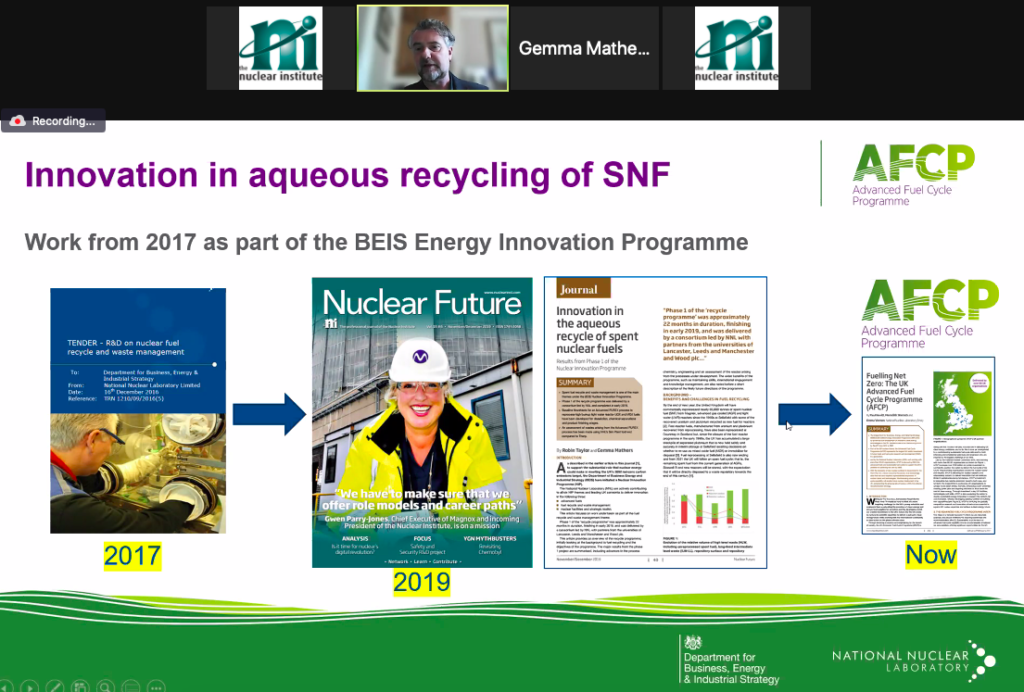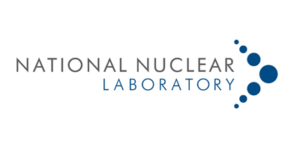Monday 29 March 2021
Pinkerton Prize awarded to National Nuclear Laboratory authors
NNL’s Robin Taylor and Gemma Mathers have won the Nuclear Institute’s Pinkerton Prize. Their award-winning paper, detailing phase one of the NNL-led and BEIS-funded Advanced Fuel Cycle Programme, presents a technical deep dive into innovation and opportunity for advanced nuclear technologies.

Each year the Nuclear Institute (NI) awards the Pinkerton Prize to the authors of the best paper in their Nuclear Future journal. This year, Robin Taylor and Gemma Mathers from the National Nuclear Laboratory (NNL) have received the prestigious award.
Although usually awarded each winter at the NI and Nuclear Industry Association Annual Dinner, the pandemic shifted the ceremony to a virtual setting. To celebrate their reception of the 2019 award, Robin and Gemma joined a dedicated NI webinar to discuss their paper and answer audience questions.
Their co-written paper, Innovation in the aqueous recycling of spent nuclear fuels, delves into phase one of the NNL-led Advanced Fuel Cycle Programme (AFCP). This topic supports the UK’s Net Zero transition through increasing the sustainability of nuclear fuel cycles and de-risking the deployment of advanced nuclear technologies.
Advancing aqueous recycle innovation
Through awarding the Pinkerton Prize, the NI recognises the authors’ outstanding work on AFCP as outlined in their technical paper. Robin and Gemma are both integral members of the programme, working as the AFCP’s Advanced Recycling and Sustainability Technical Lead and Senior Project Manager, respectively.
In their paper, Robin and Gemma describe the progress made under the first phase of AFCP’s Aqueous Recycle project, funded by the Department for Business, Energy and Industrial Strategy (BEIS) from 2017-2019. This phase one work transitioned into AFCP’s current Aqueous Recycle project, which has expanded and accelerated the UK’s progress towards demonstrating an advanced aqueous recycle option for future used fuel management.
Although funded by BEIS as part of the £505m Energy Innovation Programme (EIP), this work builds on many years of NNL’s R&D in this field. The project leverages NNL’s Advanced Recycle and Isotope Separations (ARIS) core science theme as well as other collaborations: in particular, NNL’s involvement in the Horizon 2020 EURATOM projects GENIORS, PUMMA and PATRICIA.

Supporting a Net Zero future
For nuclear energy to play a full role in meeting Net Zero by 2050, the UK must address the challenge of used fuel management. Through AFCP, NNL is working to help close the nuclear fuel cycle and sustainably recycle used fuel for new applications.
Robin and Gemma highlight these benefits within the context of aqueous recycling. Reusing nuclear materials for new fuels can extend the availability of natural resources and reduce the overall environmental impact of nuclear energy.
Additionally, this work opens the door for exciting applications beyond clean energy. The authors explain that by channelling AFCP skills and innovation in separations chemistry, nuclear scientists can separate the radioisotope americium-241 for space power sources.
By demonstrating AFCP’s technical achievements – alongside explaining these valuable impacts on sustainability, economics and UK innovation – Robin and Gemma provided an in-depth glance into NNL’s strategically important leadership role on the programme.
An award-winning outlook
NNL is honoured for the NI to recognise Robin and Gemma for their excellent contribution to Nuclear Future and AFCP.
On receiving the award, Robin Taylor said:
I have written technical papers for Nuclear Future before and I think it is a great way to communicate our work to a wider nuclear industry audience. I have always found it to be a very rewarding experience and receiving the prestigious Pinkerton Prize is the icing on the cake! I would definitely encourage others to submit technical articles to Nuclear Future.
Gemma Mathers commented:
To quote Henry Ford: If everyone is moving forward together, then success takes care of itself. Being able to publish work through Nuclear Future provides a platform for enabling collaboration and exchanging ideas, therefore supporting the wider industry in moving forward together. Winning the Pinkerton Prize means that I get to thank the amazing team of people working really hard to deliver the Advanced Fuel Cycle Programme on a bigger stage because without them there would be nothing to write about.
Sarah Beacock, CEO of the Nuclear Institute, said:
Out of 20 technical papers published in 2019, the paper by Robin Taylor and Gemma Mathers appeared in the top 4 choices of all the judges (members of the Editorial Committee). In a close-run year, Robin and Gemma’s paper was seen as highly technical in content and noted by one judge as ‘Technically excellent and cutting-edge’. Congratulations from all on the NI editorial panel who chose this paper as the 2019 winner of the Pinkerton Prize.

